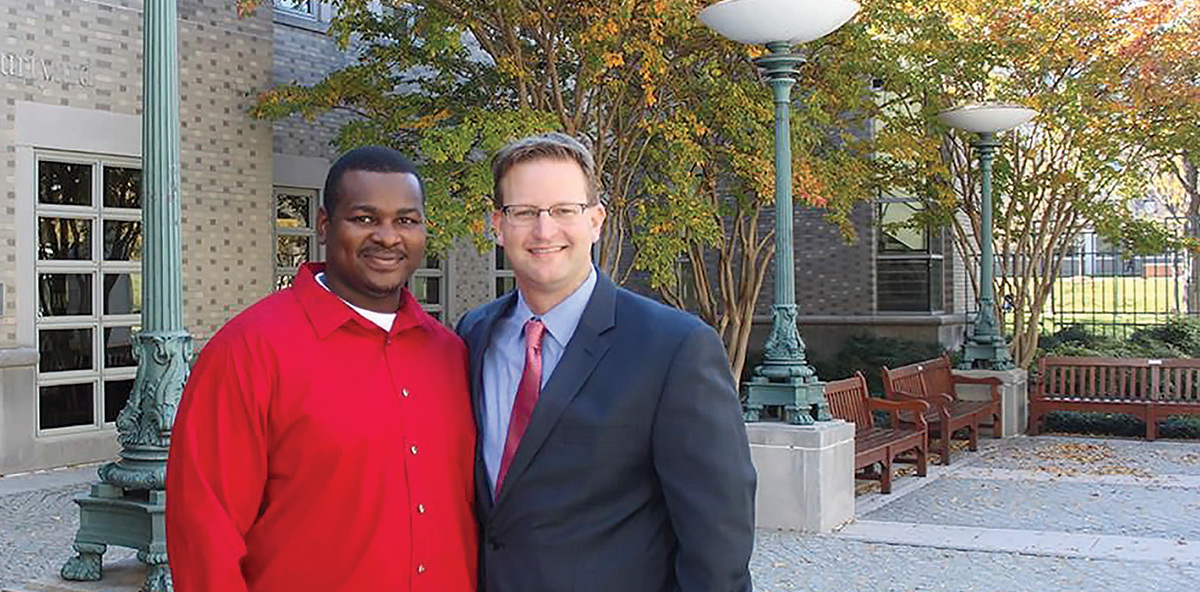

Alfred Dewayne Brown (left) with Brian Stolarz outside the Columbus School of Law.
Nine years after graduating from the Columbus School of Law, Brian Stolarz, J.D. 1998, met a prisoner on death row in Texas. Alfred Dewayne Brown had always maintained his innocence in the 2003 shooting death of a Houston police officer, and Stolarz believed him.
“I knew he was innocent the moment I met him,” Stolarz says. “And I soon realized it was the case of my life. It was why I became a lawyer in the first place.”
After earning his law degree, Stolarz worked as a public defender for the Legal Aid Society in Brooklyn, N.Y., before building a career defending individuals and companies charged with white-collar crimes. The unusual odyssey that united him with Brown began when a senior partner at his firm asked Stolarz if he wanted to take on Brown’s case pro bono.
Stolarz agreed to defend the wrongfully condemned man — even though, at first, he wasn’t expecting Brown’s exoneration.
Evidence of prosecutorial misconduct in Brown’s case surfaced when phone records corroborating his alibi were brought to light after being suppressed — they were found in a homicide detective’s home garage. Brown was freed in 2015, declared “actually innocent” in 2019, and has relocated to rural Louisiana. He and Stolarz have grown ever closer.
“I love the man,” Stolarz says. “He and I understand each other in ways that true brothers do. He became like an uncle to my kids, and they love him, too. He’s extremely caring, empathetic, and sympathetic — one of the most insightful and intelligent men I’ve ever met.”
The book Stolarz wrote about Brown’s case, Grace and Justice on Death Row: The Race Against Time and Texas to Free an Innocent Man, was published in 2016. It appeared on the The Washington Post bestseller list. Noted anti-death penalty activist Sister Helen Prejean contributed a foreword.
“She’s a personal hero of mine,” Stolarz says. “I read her book, Dead Man Walking, when I was in school. I have subsequently met her. There’s nobody like her.”
Sister Helen’s book affirmed what Stolarz had been taught growing up in a Franciscan parish, where his family attended what he describes as “a little peace, love, and happiness Church.” He came to oppose the death penalty categorically, even for the guilty.
“I am against capital punishment in all cases,” he says. “It is disproportionately given to minorities without access to good counsel. As Sister Helen said, ‘Those without the capital get the capital punishment.’”
This year, Brown’s case received renewed attention when it was explored in an episode of the Netflix series The Innocence Files. These days, defender and client maintain a busy schedule of joint appearances — usually, by video and Zoom — at high schools, colleges, and for corporations.
“It’s important for companies to have these difficult conversations about racial bias,” Stolarz says. “We talk about how the system is broken, and the fact that it was built broken. It was built against minorities from the jump.”
The law school has invited Stolarz and Brown to speak on campus several times, which Stolarz says is always a highlight of his calendar.
“Catholic University’s Columbus School of Law is a place of higher purpose,” he says. “It’s not just about the law — it’s about a calling. What can you do with this degree to make someone’s life better? You stand outside the law school building and ponder words like justice, fairness, and equality. Those are real things, and the students get it.”
Currently a partner with Fox Rothschild in Washington, D.C., Stolarz lives in Alexandria, Va., with his wife, Anna (Herndon) Stolarz, J.D. 2000, a former prosecutor, and their three children. He is still providing pro bono representation to Brown in an effort to get him the compensation he is entitled to receive after having been declared innocent in the same courtroom where he was sentenced to death.
“My personal journey with him will continue throughout my life,” Stolarz says, “but my legal journey with him will continue until he gets compensated.” — G.V